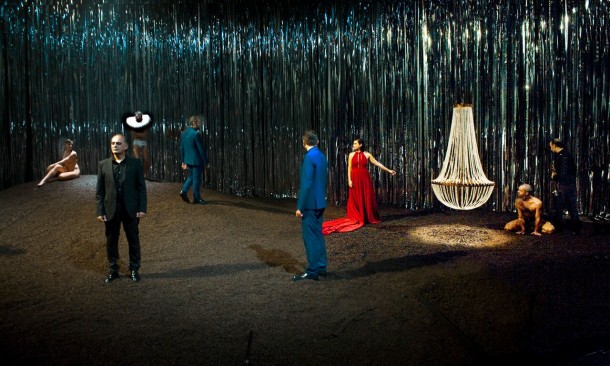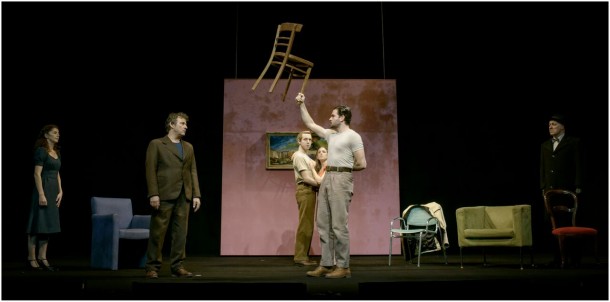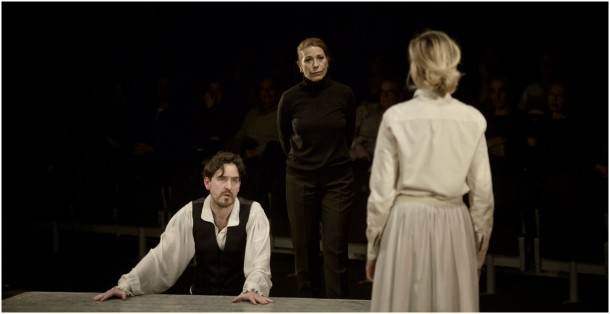Federico García Lorca is best known for his rural trilogy—Blood Wedding, Yerma, and The House of Bernarda Alba, but it is The Public, written before these iconic works that Lorca was to see as his true theatre. The play’s sexually explicit language and open treatment of homosexual desire, as well as its partial status —no complete draft survives—has led to a lean performance history. Anyone trying to tackle the play has an uphill struggle. The episodic scenes lack a cause and effect logic. Characters from different historical periods, fiction, and “reality” appear and disappear without clear explanation. Conversations are truncated and irrational. The Public is not an easy play to read; written by Lorca in New York and Havana in 1930, it is a play of raw emotional pain and heartfelt grief.
Lluís Pasqual’s now legendary 1986 production of The Public, first seen at Milan’s Piccolo theatre in 1986, proffered a new vocabulary for Lorca’s theatre. It was high energy and magical—characters rushing in an out of the circus-like arena of blue sand. This season, Àlex Rigola follows Pasqual in tackling the play, in a production first seen at Madrid’s Teatro de la Abadía in 2015. Rigola offers a more contemplative aesthetic. His is a dreamlike stage, of action realized almost as if in slow motion. Rigola’s approach might be compared to the staging of a thought process. The audience is guided from the front of house through curtains and a corridor of photos and performers posing like mannequins. The walk into the theatre is not the straightforward move from foyer to auditorium but rather a journey that necessitates engagement with Rigola’s own research journey before entering the auditorium. The Sala Juan de la Cruz has been converted into a ballroom of sorts—a sealed-off cabaret-cum-cinema decorated with silver tassels and a soft undulating cork-like floor. It is a space that is both physical and figurative, the place of performance and the inside of the author’s head.
The effect is uncanny. Masked bellboys lend an eerie 1920s feel to the proceedings. The sound of Lorca accompanying the singer La Argentinita on the piano alternates with the melancholy numbers of the onstage band. Footage of Lorca with the student theatre company La Barraca offers a reminder of the writer’s ghostly presence that hovers over the proceedings. Max Glaenzel’s open space is more metaphorical than literal—a space where the horses fall like cards, where the students at the theatre are reading The Public, and where the staging “talks to” the ghosts of Pasqual’s earlier production. A giant chandelier that rises and falls to meet the demands of each scene also references the bourgeois theatre that Lorca sought to challenge with his more audacious writings.

Lorca’s The Public directed by Àlex Rigola at the Sala Juan de la Cruz. Photo courtesy of Teatro de la Abadía.
Characters mutate in and out of the band. Pep Tosar’s crooner becomes the Stage Director, Enrique. The First Man’s trumpet blasts the three horses (here performed by two actors and an actress with naked oiled bodies) away like ghosts. The three men are all in pristine black suits—echoing the production’s palette of dark colors. The Figure in Vine Leaves and Figure in Bells are almost mirror images of each other with gold paper crowns, circling each other with fevered intensity but with a vocal register that remains rather one-dimensional. There is something almost reminiscent of Banksy in the blood splattered “Energizer Bunny” rabbit costumes of the Centurion’s troops—embodying a decadence and dirt that speaks to a soiled world. The extensive doubling creates the sense of character as fleeting and unstable. The Black Horse mutates into the Magician for the play’s final scene, a debate that sees Tosar raise his game as the tortured Stage Director. The Emperor is simply an offstage voice—as dismembered and mechanical as the broken bodies that wander the stage. I wonder if, for all Laia Durán’s animated performance as the Third Horse, the unbridled masculinity embodied by the horses is somewhat dissipated by the female body on stage.
Irene Escobar was the revelation of the evening for me as an animated, fiery Juliet who injects a welcome blast of energy into the production, ripping through the subdued texture of Rigola’s pensive staging. As the Señora (Gonzalo’s mother), she is an ominous figure, unwilling to disappear into the background as she cries out for her absent son. Escobar’s voice cuts through the space like a knife. Her dynamism is a welcome contrast to Pep Tosar’s rather absent Director. He only comes into his own in the final scene, when confronted by the Magician; otherwise it’s a curiously quiet performance.
Rigola’s production gives us formalism and pain; the production stages the chaos, depression, and mental instability that might have served as the genesis of the play. It has poetry and languor; it has decadence and squalor. I missed, however, the spark of dark humour and urgency that so marked Pasqual’s production. I saw the production at Madrid’s Teatro de la Abadía where it ran from 28 October to 29 November but it also enjoyed a later run at the Teatre Nacional de Catalunya’s Sala Gran from 17 December to 3 January.
Els veïns de Dalt
Cesc Gay is best known as a screenwriter and director. Truman (staring Javier Cámara and Ricardo Darín) won a series of trophies at this year’s Goya Awards ceremony (including Best Actor and Best Supporting Actor). Gay is a fine director of actors whose films often create scenarios where particular characters unravel over the course of the action. It is in the minutiae of the journeys undertaken by his protagonists that the dynamics of the narrative are often played out. Gay takes the time to map the characters’ emotional journeys and takes the viewer along with him. It’s why his films have punch and heart.
His first play, Els veïns de Dalt (The Upstairs Neighbours) is no exception, enjoying a return run at the Barcelona’s Teatre Romea after its opening in March 2015. It’s a piece inspired by the noise generated by new upstairs neighbours in the flat occupied by Gay and his family. From what might have turned into a tragedy of misunderstanding comes a comedy of mismatched couples and double entendres. In a variation on the Abigail’s Party format, a middle-aged, middle-class couple invite their upstairs neighbours over for drinks and nibbles because it’s the “done thing.” Juli (Pere Arquillué) and Anna (Àgata Rota) are prim and proper, with a sense of social manners and firm views on where boundaries should lie. They are also experiencing a period of marital tension and irritation that is all too apparent. The “perfect life,” putting child care before her own career aspirations and dreams, has taken its toll on Anna’s energy and patience. Even the arrival of their neighbors can’t put a stop to the recriminations and snide remarks. While Juli and Anna see themselves as progressive liberals, their ideals and parameters are tested by Jordi Rico’s fireman Salva and Carme Pla’s bubby psychologist, Laura, whose upstairs flat serves as a love nest for spousal swapping, free love, and open sex.

The Upstairs Neighbours by Cesc Gay. Photo courtesy of Teatre Romea.
Alejandro Andújar’s set offers a kitchen-dining area that smacks of Scandi design; functional shelving with condiments, pots and pans, and drinks, all neatly put away. It’s a space that Anna likes to control but its order is gradually eroded as the play progresses. The to-ing and fro-ing of the quartet lends the piece the air of an Ayckbourn or Ray Cooney farce but there’s also an element of Yasmina Reza’s bitter black comedies and Albee’s Who’s Afraid of Virginia Woolf? in the tone of the language and violence that’s unleashed during the course of the production. (There are certainly echoes in Arquillué’s performance of his battered George in Daniel Veronese’s 2012 production of the play.) Carme Pla deploys her elastic features to good use as the vivacious Laura while Jordi Rico’s Salva uses the façade of a down-to-earth firefighter to mask a more calculating temperament. Pla and Rico do suffer, however, from having the least interesting of the roles—like Nick and Honey in Who’s Afraid of Virginia Woolf?, they are the catalysts that show the rotten core at the heart of the other couple’s marriage. Their revelations and offers put Juli and Anna on the defensive but it is Arquillué and Roca who have the meatier roles.
Gay directs at a brisk pace, with an impressive understanding of the rhythmic demands of farce. As such the energy never falters, and the language’s deftness is allowed to soar. Roca is excellent as the frustrated spouse realizing that there is so much more available to her and there is a genuinely dangerous quality to her flirtatious acts with Salva. Arquillué looks on like a giant wounded bear; he rants and raves, he paces and pants, and he tries to put himself in his wife’s shoes when all other options are exhausted. It may not appear to be his show at the play’s outset but it certainly is by the staging’s end.
Els veïns de Dalt is one of a number of productions returning for a second run in Barcelona. King Lear (reviewed in vol. 4, Delgado, “Silence, Shakespeare and the Art of Taking Sides: Report from Barcelona”), returns to the Teatre Lliure’s Sala Fabià Puigserver with the legendary Nuria Espert in the title role at “Fourscore and upward,” exactly Lear’s age. The production remains as compelling as it was in 2015 with certain instances standing out; Lear’s mischievous complicity with Teresa Lozano’s Fool, the charisma of Ramon Madaula’s Kent, the directness of Andrea Ros’s waif-like Cordelia. Watching the production again, I was struck by a new rapport between Espert’s Lear and Julio Manrique’s grungy Edgar that brought a new energy to the storm scene. Espert shines, her bristling anger a wonderful balance to Jordi Bosch’s measured Gloucester. Pasqual’s production remains a symphonic work where the combination of vocal inflections melds with the musical score to create a richly textured contemplation of the implications of domestic dysfunction on the wider body politic.
A View from the Bridge
Ivo Van Hove’s A View from the Bridge provided such a fresh dynamic reading of the play that all productions of the piece now appear rather tired and staid in comparison. Still, Georges Lavaudant’s staging for the Romea theatre has much to commend it. At its center is a memorable performance by Eduard Fernández as Eddie Carbone. This Carbone does not have the lithe energy of Mark Strong, the brawling, bear-like presence of Michael Gambon or the raw firepower of José Bódalo. Instead we have a rather clownish figure who swaggers and talks his way out of a tricky situation. He dances as he boxes before Rodrigo fired up by a cocktail of passion, resentment and fear. There’s a nervous energy to him that proves rather disarming. Wearing a comical Santa Claus hat, Eddie teeters from side to side while drunk, holding two bottles of whisky as if managing a juggling act. He weeps as Catherine declares she’s leaving with Rodrigo, impulsively kissing both her and Rodrigo violently on the lips. In bed on the day of Catherine and Rodrigo’s wedding, he looks like a drunken Gianni Schicchi propped up in bed. At one point his arms open out like those of a crucified Messiah. This Eddie has a desperate need to make his presence felt
Fernández’s agitated Eddie is effectively balanced by Mercè Pons’ resigned Beatrice. Her eyes wander and see more than her words reveal. She looks and moves like a woman worn down by life who tries to do the best thing. It’s an unshowy performance, but a convincing one. Jordi Martínez’s Alfieri is a Nosferatu-like figure with long black gloves; he hovers ominously along the back of the action in an unusually wooden performance. Marina Salas’s Catherine struck me as overly gauche; there’s too much effort involved in showing she’s a young woman rather than just easing into the role. It’s an irritating performance and one that doesn’t appear to take issues of class into consideration. Marcel Borràs is a persuasive Rodolfo, lanky and gangly with a goofy smile and a keen to please air. Pep Ambrós infuses Marco with a balance between open appreciation and angry revenge.
Jean-Pierre Vergier’s set struck me as functional rather than inspired. Projections by Francesc Isern suggest the broader city in which the characters appear as small pawns in the landscape. Panels fly down to create interior rooms but the furniture doesn’t cohere to suggest a particular era. The phone booth appears onstage numerous times, serving as a premonition of what is to come. It deprives the piece of the sense of mystery that it needs and lends to the proceedings an overly predictable air.
Infàmia
There’s no shortage of mystery in Infàmia, Pere Riera’s new play at the Villarroel. Infàmia is an openly metatheatrical work which takes place over four days of rehearsal for Hamlet. It melds Riera’s pechant for melodrama, evident in the earlier Barcelona (2013), with the intricate wordplay of Shaffer’s Sleuth. Emma Vilarasau is Eva Dolç, an established actress who suddenly stopped working when at the top of her game, selecting instead to train a few select students in a claustrophobic basement room where the action evolves. Sara (Anna Moliner) is one of her students; an actress who is struggling to get work, visiting Eva in the hope of improving her technique and her chances. Aleix (Francesc Ferrer) is at an altogether different place; he’s “made it” through a popular TV series and now wants to increase his chances of securing a broader range of work.
Into this mix comes Toni (Jordi Boixaderas), an old colleague of Eva’s. He’s trying to persuade her to return to the stage, but the schism between them appears too wide. Eva pursues an aesthetic closer to the laboratory work of Grotowski and Brook, a search for purity and essence or what she terms “authenticity.” Toni promotes a different approach—a more ludic theatricality and gameplay. The battle between them is in many ways the core dilemma of the play. Infàmia is also in many ways a tale about authorship and the construction of meaning. How much does a director control the action? What agency might an actor have? Who runs the performance?

Infàmia by Pere Riera. Photo courtesy of the Villarroel Theatre.
Vilarasau has much of Rosa Maria Sardà about her: the sharp retorts; the peering over her glasses with a Maggie Smith-like look of disdain; the pointed responses; the constant search for a perfectionism that threatens to crush her students. She may pursue the pure but she is a gloriously theatrical being. Boixaderas, on the other hand, celebrates a sense of play but he is, ironically, a flatter stage presence, and an effective contrast to Vilarasau for that reason. In many ways this is a schematic work with different positions articulated through the four roles: four visions of theatre, four dilemmas unfolding through the narrative. Riera directs effectively, pacing the work deliberately so that the audience savors the debates articulated and embodied through the four performances.
Hotel Paradiso
An altogether more pleasurable theatricality is on display at the Teatre Lliure in the hugely entertaining Hotel Paradiso by Berlin-based company Familie Flöz directed by Michel Vogel. This is a show that has been around since 2008 but it still feels fresh, funny and refreshingly unpretentious. There’s something of both Wes Anderson’s Grand Budapest Hotel and Fawlty Towers in the antics at this small town Alpine establishment where the four stars over the door looks dangerously close to being dislodged (both physically and metaphorically). The hotel’s previous owner makes his presence felt with his portrait hanging high on the wall looking sternly down at his descendants. Indeed, his widow oversees a rather ramshackle establishment that has seen better days. She is a fierce matriarch who hobbles in and out with an ominous walking stick that she deploys as a weapon as and when necessary. She comes across as a Judy-like figure beating her Punch-like shy son with either her stick or her Margaret Thatcher handbag. Her daughter sashays in and out of the establishment in bright red outfits and swinging handbag like a 1960s supermodel. She wants to run a different kind of hotel and seeks to spruce up the tired curtains with her own eclectic aesthetic. The staff who service the hotel include a much maligned bellboy, a kleptomaniac cleaner who hides a plethora of objects in her wide skirts, and a tattooed cook with a noisy dog and a ferocious appetite. Into the hotel an array of guests come and go, including a Zen hippie, a posh woman in furs, a thief with a bag of goods, and two hapless policemen in pursuit. The farcical action—with deaths, disappearances, entries, and exits—insures that there is never a dull moment in the eighty-minute long performance.
Four actors cover the dizzying number of roles, with a different mask delineating each character. (A particular pleasure in the curtain call comes from seeing a male actor emerge as the performer of the wizened mother.) There isn’t a single line of dialogue, but the performers’ nimble bodies convey the creaky challenges of old age, the despair of unrequited love, and the thrills of undertaking forbidden acts. It’s a show of great verve, physical energy, and corporeal precision. The timing is exquisite, with perfectly orchestrated comings and goings threatening to push the action into the realm of the catastrophic. The production manages to juggle the different strands with inventive wit. The audience’s pleasure was palpable—this is a laugh out loud show with verve, vigour, vitality, and a wonderful sense of complicity. We left the theatre with great big smiles on our faces.
is Professor and Director of Research at Royal Central School of Speech and Drama, University of London, and Honorary Fellow of the Institute for Modern Language Research at the University of London. Her books include “Other” Spanish Theatres: Erasure and Inscription on the Twentieth Century Spanish Stage (MUP, 2003) and Federico García Lorca (Routledge, 2008), and the co-edited Contemporary European Theatre Directors (Routledge, 2010) and A History of Theatre in Spain (Cambridge University Press, 2012). She has published two collections of translations for Methuen and is co-editor of Contemporary Theatre Review.
European Stages, vol. 6, no. 1 (Spring 2016)
Editorial Board:
Marvin Carlson, Senior Editor, Founder
Krystyna Illakowicz, Co-Editor
Dominika Laster, Co-Editor
Kalina Stefanova, Co-Editor
Editorial Staff:
Elyse Singer, Managing Editor
Clio Unger, Editorial Assistant
Advisory Board:
Joshua Abrams
Christopher Balme
Maria Delgado
Allen Kuharsky
Bryce Lease
Jennifer Parker-Starbuck
Magda Romańska
Laurence Senelick
Daniele Vianello
Phyllis Zatlin
Table of Contents:
- Hamlet in a Curious Nutshell by Maria Helena Serôdio
- Alvis Hermanis Productions in Latvia and German-Speaking Countries by Edīte Tisheizere
- The Unknown, the Unexpected, and the Uncanny: A New Lorca, Three New Catalan Productions, and a Few Extras by Maria M. Delgado
- 2015 Dance Week Festival and Contemporary Croatian Dance by Mirna Zagar
- Archives, Classics, and Auras: The 2016 Oslo International Festival by Andrew Friedman
- The Stakes for City Theatres: Linus Tunström’s Farewell to the Uppsala Stadsteater by Bryce Lease
- Life is Beautiful? or Optimistically About Bulgarian Theatre? by Kalina Stefanova
- The Multiple Dimensions of the Bulgarian ACT Independent Theatre Festival 2015 by Angelina Georieva
- Theatre in Berlin, Winter 2015 by Steve Earnest
- Musical Theatre in Berlin, Winter 2015 by Steve Earnest
- Gob Squad’s My Square Lady at the Komische Oper by Clio Unger
- New Productions in Berlin by Yvonne Shafer
- Manifest for Dialogue: Antisocial by Ion M. Tomuș
- A Fall in France by Heather Jeanne Denyer
- The Iliad as an Oratory: A Warning to a Civilization by Ivan Medenica
- Escaped Alone by Caryl Churchill at the Royal Court Theatre by Rosemary Malague
- Bakkhai at the Almeida Theatre reviewed by Neil Forsyth
Martin E. Segal Theatre Center:
Frank Hentschker, Executive Director
Marvin Carlson, Director of Publications
Rebecca Sheahan, Managing Director
©2016 by Martin E. Segal Theatre Center
The Graduate Center CUNY Graduate Center
365 Fifth Avenue
New York NY 10016



